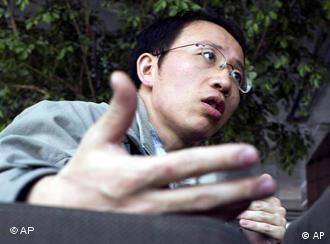
His wife and fellow activist, Zeng Jinyan, made the announcement on Twitter: "Hu Jia came home at 2:30 am. Safe, very happy. He needs time to recuperate. Thank you, everyone."
The release of the human rights activist comes days after the artist Ai Weiwei was released from nearly three months' detention and after four of Weiwei's associates were also freed on Saturday.
But it seems Hu may be facing strict curbs on his freedom, just like Ai and a range of other activists who have apparently been ordered to keep quiet. Ai has uncharacteristically refused to make any public comment since his release. Hu's house appears to be under surveillance.
The releases have been seen as an attempt by China to defuse criticism whilst Premier Wen Jiabao is on a diplomatic visit to Europe, visiting Hungary, Britain and Germany.
No contact with the media
Zeng said last week on Twitter that Hu, whose release was expected as he had served his jail term, will "not be able to meet with the media."
Zeng had complained that her husband had received inadequate medical treatment during his time in jail. Hu suffers from cirrhosis of the liver.
As a result of their campaigns, Hu and Zeng have suffered repeated detentions and periods of house arrest that they have described as unlawful.
New York-based activist group Human Rights Watch on Friday urged the Chinese government not to subject Hu and his family to "house arrest or other extrajudicial deprivations of liberty."
Hu's won the European Parliament's Sakharov Prize for Freedom of Thought in 2008.
While calling the recent releases good news for the people freed, Amnesty International said in a statement that at least 130 additional activists, lawyers and bloggers who have been detained, forcibly disappeared, harassed and imprisoned within their homes since February.
Author: Joanna Impey (AFP, dpa)
Editor: Sean Sinico
(via Deutsche Welle)